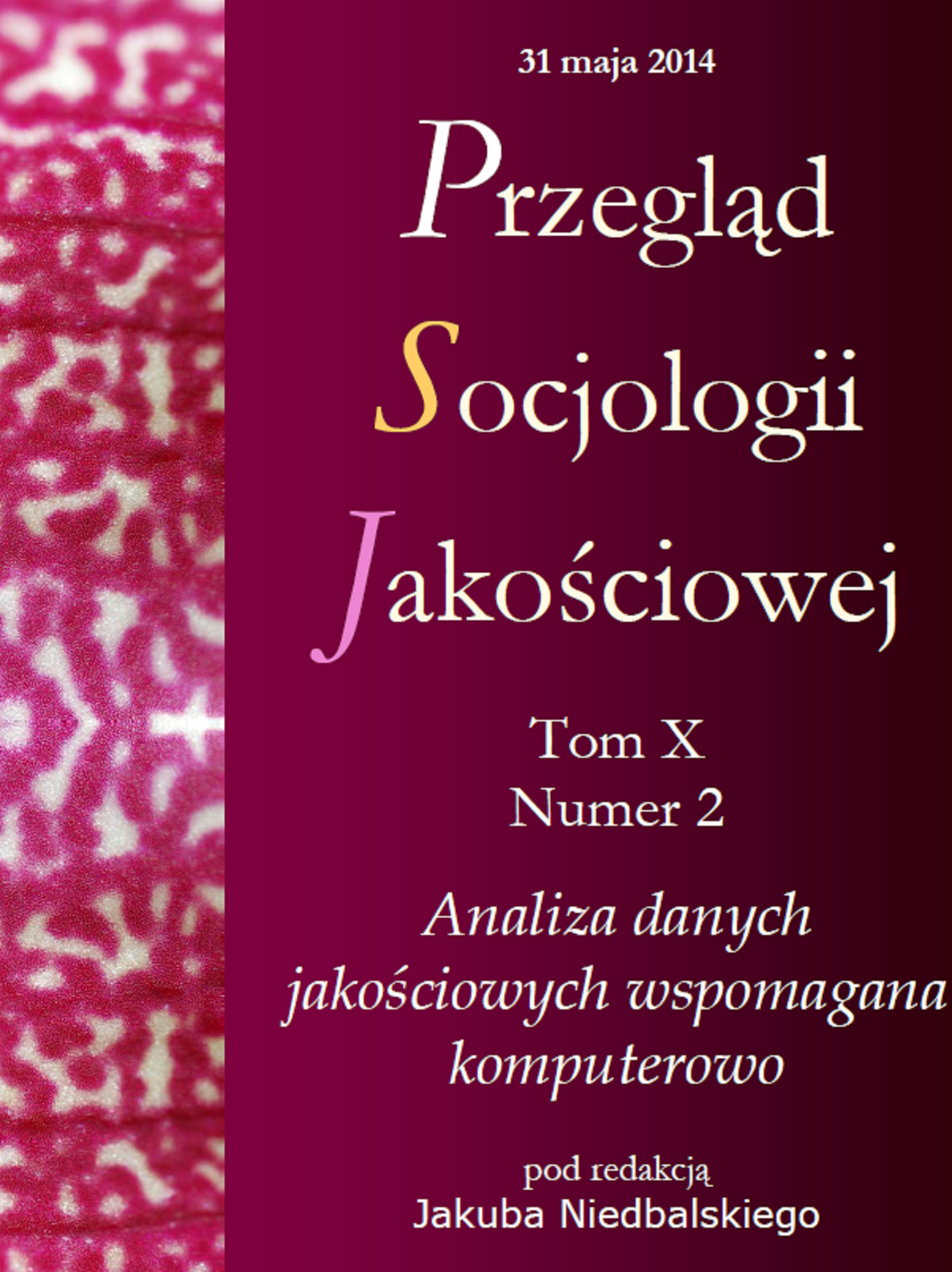Reciprocity (?) of Perspectives in the World of Classical Music. Autoethnography of Sociologist-Observer and Japanese Language Translator
DOI:
https://doi.org/10.18778/1733-8069.10.3.11Keywords:
analytic autoethnography, Japanese musicians, Japanese culture, world art, language, sociology of artistic professionAbstract
This paper lays out advantages and disadvantages of the practical use of analytic autoethnorgaphy (Leon Anderson 2006) in qualitative research focused on professional careers of artists in art world (Howard Becker 1982), namely that of classical music. The research concerned the problem of networking and culturally conditioned interactions between Japanese and Polish artists involved in international artistic projects. While observing the process of cooperation between the abovementioned groups of artists, the researcher played the role of translator and so-called intercultural mediator, and as such became a member of their artistic reality (In-Complete Member Researcher). This fact justified the application of autoethnographic paradigm – though in an altered form – to the research and thus, enabled the author to better understand the process of social construction of intercultural interactions. Furthermore, by presenting the results of autoethnographic analysis, the author is also trying to show how this method serves as a tool which enhances validity and reliability of data collected through a foreign language (here: Japanese).
Downloads
References
Anderson Leon (2006) Analytic Autoethnography. „Journal of Contemporary Ethnography”, vol. 35, no. 4, s. 373–395.
Google Scholar
DOI: https://doi.org/10.1177/0891241605280449
Babbie Earl (2003) Badania społeczne w praktyce. Przełożyli Witold Betkiewicz i in. Warszawa: Wydawnictwo Naukowe PWN.
Google Scholar
Becker Howard (1982) Art Worlds. Berkeley: University of California Press.
Google Scholar
Bernstein Arthur, Sekine Naoki, Weissman Dick (2007) The Global Music Industry. Three perspectives. Nowy Jork: Routledge.
Google Scholar
Bizeul Daniel (1999) Faire avec les deconvenues. Une enquete en milieu nomade. „Societe Contemporaine”, no. 33/34, s. 111–137.
Google Scholar
DOI: https://doi.org/10.3406/socco.1999.1753
Davies Charlotte (1997) Reflexive Ethnography: A Guide to Researching Selves and Others. London: Routledge.
Google Scholar
Denda Fumio (2004) Nihonjin wa kurashikku ongaku wo dō ha’aku suru ka [Jak Japończycy odbierają muzykę klasyczną?]. Tōkyō: Geijutsugeidaisha.
Google Scholar
Garfinkel Harold (1967) Studies in Ethnomethodology. Englewood Cliffs: Prentice Hall.
Google Scholar
Glaser Barney G., Strauss Anselm L. (1965) Temporal Aspects of Dying as a Non-Scheduled Status Passage. „American Journal of Sociology”, vol. 71, no. 1, s. 48–59.
Google Scholar
DOI: https://doi.org/10.1086/223992
Granovetter Mark (1973) The Strength of Weak Ties. „American Journal of Sociology”, vol. 78, no. 6, s. 1360–1380.
Google Scholar
DOI: https://doi.org/10.1086/225469
Hałas Elżbieta (1994) Obywatelska socjologia szkoły chicagowskiej. Lublin: Redakcja Wydawnictw KUL.
Google Scholar
Hendry Joy (1999) An Anthropologist in Japan. Glimpses of Life in the Field. London: Routledge.
Google Scholar
Hughes Everett C. (1937) Institutional Office and the Person. „American Journal of Sociology”, vol. 43, s. 404–413.
Google Scholar
DOI: https://doi.org/10.1086/217711
Hughes Everett C. (1958) Men and Their Work. Glencoe: Free Press.
Google Scholar
Konecki Krzysztof (2005) Wizualne wyobrażenia. Główne strategie badawcze w socjologii wizualnej a metodologia teorii ugruntowanej. „Przegląd Socjologii Jakościowej”, t. 1, nr 1, s. 42–63 [dostęp 4 września 2013 r.] Dostępny w Internecie http://www.qualitativesociologyreview.org/PL/Volume1/PSJ_1_1_Konecki.pdf
Google Scholar
DOI: https://doi.org/10.18778/1733-8069.1.1.04
Korporowicz Leszek (1997) Słownik ważniejszych pojęć [w]: tenże, Ewaluacja w edukacji. Warszawa: Oficyna Naukowa, s. 278–281.
Google Scholar
Le Bon Gustave (1994) Psychologia tłumu. Przełożył Bolesław Kaprocki. Warszawa: PWN.
Google Scholar
Matsumoto Yoshiko, Okamoto Shigeko (2003) The Construction of the Japanese Language and Culture in Teaching Japanese as a Foreign Language. „Japanese Language and Literature”, vol. 37, no. 1, s. 27–48.
Google Scholar
DOI: https://doi.org/10.2307/3594874
Pawson Ray (1996) Theorizing the Interview. „The British Journal of Sociology”, vol. 47, no. 2, s. 295–314.
Google Scholar
DOI: https://doi.org/10.2307/591728
Riemann Gerhard, Schütze Fritz (2012) „Trajektoria” jako podstawowa koncepcja teoretyczna w analizach cierpienia i bezładnych procesów społecznych [w:] Kaja Kaźmierska, red., Metoda biograficzna w socjologii. Kraków: Nomos, s. 389–414.
Google Scholar
Rosenblum Karen E. (1987) The In-Depth Interview: Between Science and Sociability. „Sociological Forum”, vol. 2, no. 2, s. 388–400.
Google Scholar
DOI: https://doi.org/10.1007/BF01124171
Senechal de la Roche Roberta (1996) Collective Violence as Social Control. „Sociological Forum”, vol. 11, no. 1, s. 97–128.
Google Scholar
DOI: https://doi.org/10.1007/BF02408303
Smelser Neil (1994) Sociology. Cambridge: Blackwell Publications.
Google Scholar
Strauss Anselm (1991) Continual Permutations of Action. New Brunswick, New Jersey: Transaction Publishers.
Google Scholar
Sugimoto Yoshio (2003) An Introduction to Japanese Society. New York: Cambridge University Press.
Google Scholar
Sugimoto Yoshio, ed. (2009) Cambridge Companion to Modern Japanese Culture. Cambridge: Cambridge University Press.
Google Scholar
DOI: https://doi.org/10.1017/CCOL9780521880473
Urbańska Sylwia (2012) Autoetnografia [w:] Krzysztof. Konecki, Piotr Chomczyński, red., Słownik socjologii jakościowej. Warszawa: Difin, s. 34–39.
Google Scholar
Wagner Izabela (w druku) Producing of Excellence. The Making of the Virtuoso. Routledge.
Google Scholar
Wierzbicka Anna (1996) Japanese Cultural Scripts: Cultural Psychology and “Cultural Grammar”. „Ethos”, vol. 24, no. 3, s. 527–555.
Google Scholar
DOI: https://doi.org/10.1525/eth.1996.24.3.02a00060
Downloads
Published
How to Cite
Issue
Section
License

This work is licensed under a Creative Commons Attribution-NonCommercial-NoDerivatives 4.0 International License.














